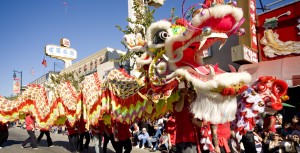Happy (Lunar) New Year!
Wednesday, February 18th, 2015February 18, 2015

Chinese New Year celebrations in many places include a dragon dance. Performers carry an elaborate dragon puppet made of bamboo, paper, and silk, parading the colorful puppet through the streets. The dragon symbolizes good luck, and the dance invites success in the coming year. (Credit © Shutterstock)
Across Asia, and in many Asian communities elsewhere, people are preparing to welcome in the lunar New Year. This new year falls on the second new moon after the winter solstice (when the sun appears at its most southerly position—on December 21 or 22). The traditional date in Asia is between January 21 and February 20. The Lunar New Year in 2015 is February 19, so today is New Year’s Eve. The lunar New Year will be celebrated until the Lantern Festival, observed this year on March 5.
In advance of the new year, Asian people believe they must try to complete unfinished business from the current year. People might pay remaining debts or apologize to friends from whom they have become estranged. They also clean their house very carefully.
On New Year’s Eve, the celebration begins with a reunion dinner, and all family members try to attend this meal. Many millions of Asians travel home for the New Year’s celebrations. Chinese media report that some three billion passenger trips will be made during the 40-day holiday in 2015. At the reunion dinner, places will be set at the table even for family members who are unable to attend, in order to maintain family unity. Before the meal, paper offerings will be made to gods and ancestors—special paper is burnt in the belief that a message or prayer rises with the smoke. Children receive gifts of red envelopes that contain New Year’s money.
For the reunion meal, special foods are chosen. For example, a whole fish might be served because the word for fish sounds the same as the word for plenty in Chinese. Thus, the fish served becomes a wish for abundance in the coming year. People also serve nuts and sweets, hoping to set a trend for the year.
In the past, the New Year’s holiday spanned the entire 40-day period. In modern times, only a few days are celebrated. Much of this time is devoted to visiting relatives and friends. People may also visit temples. Parades are often held to celebrate the new year.
Additional World Book article:
.


